- Register
- Log in to Tune-In
- Wishlist (0)
-
Shopping cart
(0)
You have no items in your shopping cart.
Conditions of use
Use don't abuse please:

Although The Beatles didn’t write or record the original version of “Twist And Shout”, this early rock ‘n’ roll number became inextricably linked to the Fab Four’s musical legacy when they released their rendition of Phil Medley and Bert Berns’ song on March 2, 1964. (This came almost a full year after the band released the track on their debut album, Please Please Me, in their native U.K.)
The Beatles’ version of “Twist And Shout” was a massive success, topping the charts in the U.S., Argentina, New Zealand, and Finland. The song also reached Top 10 status in Canada, Australia, Spain, Sweden, and the Netherlands. “Twist And Shout” was also notable in that it was The Beatles’ first and only cover song to reach No. 1 in the U.S. Interestingly, this chart-topper ranking only came from Cash Box. On the Billboard Hot 100, the song only reached No. 2 because The Beatles’ other single, “Can’t Buy Me Love”, was riding high at No. 1.
However, that success didn’t come easy. According to John Lennon, who performed lead vocals on “Twist And Shout”, the song “nearly killed” him. The details
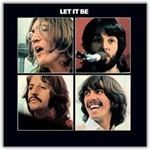
When Let It Be arrived in 1970, it was meant to signal a fresh start for The Beatles—a stripped-down return to the camaraderie that once defined them. Instead, the sessions exposed deep fractures, with creative clashes and personal resentments spilling into the music, leaving some historians and fans to view the release as the moment the world’s biggest band could no longer hold itself together.
On Sunday, March 1, Far Out Magazine compiled a list of albums that left musicians "cursed," and Let It Be took the No. 1 spot. The album was one of the final projects of Paul McCartney, John Lennon, George Harrison, and Ringo Starr.
"It was a disaster," biographer Barry Miles previously wrote, according to the outlet. "Paul bossed George around; George was moody and resentful. John would not even go to the bathroom without Yoko at his side … The tension was palpable."
And many fans would agree that Let It Be was the beginning of the end for The Beatles.
"'Let It Be' is a project that was scarred by the huge shadow of resentment the Beatles had for each other when it finally came out," Giles Martin, son of late Beatles producer Sir George Martin, previously told People magazine. "That's details

Ringo Starr has a very unique place in The Beatles’ career. While most listeners know that the band’s sound wouldn’t have been what it is without Starr’s singular playing, his non-flashy, simple style keeps him from the spotlight at times.
Starr’s playing is characterized by impeccable timing. He always knew exactly what to play for each song, whether a simple blues-rock number or a psychedelic haze. Even Starr himself recognizes his timing. He once credited it as the thing he’s most proud of from his time with the group.
Starr was brought on after the other three members had been established, but The Beatles didn’t become The Beatles until Starr joined their ranks. Right from the start, it was clear that Starr’s timing was going to completely reshape the group’s career.
“Yeah, and I’ve got a lot of footage of George,” Starr once said. “He had that great line, he said, ‘You know, and the Beatles did this,’ and somebody said to him, ‘Did you have a click track?’ He said, ‘Yes, we did. Ringo, his name was.’”
Starr’s Timing
According to Starr, there is no trick to his si details

Tehuan Harris is a news and features journalist at Collider, reporting and writing about all things music and reality TV (sometimes). She is a talented journalist and a natural storyteller who writes with curiosity and interest. After graduating from university, she jumped straight into journalism, with one goal in mind: to tell stories that matter.
Only the Fab Four saw the breakup coming, as tensions had been brewing for a while. However, the show must go on, as all four members of The Beatles pursued solo careers. George Harrison’s first stop was at the studio with Bob Dylan, as he helped him record “If Not for You,” a love song for Dylan’s wife, Sara, before their turbulent divorce.
Although Dylan was friendly with The Beatles, which led the four-piece band to record “I’m a Loser” inspired by the man himself, Dylan was closer to Harrison than to any other member. “If Not for You” helped build a friendship that no one in music can replicate, and the pair came together in a supergroup called The Travelling Wilburys. However, the friendship would not last as long as it should, as Harrison would soon succumb to cancer in 2001.
Harrison grabbed the opp details

Of the four distinct personalities that comprised The Beatles, the one largely regarded as the most clean-cut, straight-laced, and the kind of guy you’d be willing to introduce to your parents was the “cute” one, Sir Paul McCartney. Yet, in an ironic twist of events, McCartney was the first Beatle to spend a significant time in jail over drug possession. Of course, it wasn’t the charge that was remarkable—everyone but Ringo Starr had already had run-ins with the police over drugs by 1980. But Macca was in the wrong place at the wrong time.
More specifically, the musical legend behind hits like “Blackbird”, “Helter Skelter”, and “Yesterday” was at the Tokyo International Airport while on tour with his band Wings. The musicians had recently been in the States, and while there, McCartney had amassed an, er, significant collection of marijuana. Not wanting to waste his stash, McCartney quickly threw it into his carry-on luggage and went through airport security.
As McCartney described it, “When the fellow pulled it out of the suitcase, he looked more embarrassed than me,” per Performing Songwriter. “I think he just wanted to put it b details
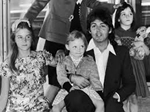
McCartney's oldest child, Heather Louise McCartney, was born to Linda and her then-husband Joseph Melville See Jr., on Dec. 31, 1962, in Tucson, Ariz. By the time she was 3, however, Heather's parents had divorced.
In 1967, Linda and McCartney met. The couple got married on March 2, 1969, and McCartney officially adopted Heather around the same time. Like her parents, Heather has pursued a career in the creative arts. She studied printing at the Photographers' Workshop in Covent Garden, London, later winning the Young Black and White Printer of the Year award.
She then studied pottery and design in college and became an established potter. She eventually launched her own line of houseware products, called Heather McCartney Designs. In 1999, McCartney traveled to Atlanta to support the launch of Heather's brand, marking his first public appearance in the United States since Linda's death the previous year. "I'm happy to be here," he told Entertainment Tonight. "She's a lovely girl and I'm very proud of her."
When asked by the outlet who her biggest inspirations were, Heather answered, "My mom and dad. My brother and sisters, completely."
Aside from appearances in the documentaries The Be details

Fans of The Beatles are about to get a new look at the band from the point of view of George Harrison.
Random House is set to release the new book The Third Eye: Early Photographs in October, described as “the first ever collection of George Harrison’s personal photos taken between 1963 and 1970.”
The book will feature over 200 color and black-and-white images capturing the rise of The Beatles. The images, curated by Harrison’s widow, Olivia Harrison, were taken from the rocker’s personal photos and 8mm film stills.
According to the description, the photos give fans an “inside look at the human beings behind the Beatles, trying to hold onto themselves-and enjoy themselves-while standing at the center of the storm.”
The book will include essays by Olivia, as well as authors Colm Tóibín and George Saunders, and the photos will feature commentary, including never-before-seen quotes from George.
The Third Eye: Early Photographs will be released Oct. 6 in the U.S. and is available for preorder now. There will also be a deluxe edition coming later in the fall.
Source: Everett Post
details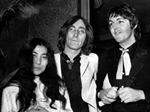
The train from London cut through the verdant English countryside like a dreamy reverie. Tidy suburbs gave way to rolling hills until I was deposited in East Sussex, the enclave along the English Channel where Paul McCartney maintains a 160-acre estate and neighboring recording studio. The landscape outside looked like Hobbiton: sheep and hares dotting the meadows, a Dutch windmill towering overhead.
When Sir Paul arrived, he was dressed entirely in black, looking spry and sunny. He guided me to an upstairs lounge, where we settled on a couch, a plate of chocolate chip cookies between us. For the next hour and 20 minutes, it was just Paul and me.
Man on the Run, a new documentary about McCartney’s formation of Wings in the 1970s, arrives on Prime Video February 27. Directed by Morgan Neville, it is another in a series of McCartney-approved films that burnish not only the Beatles’ legacy, but also his own. The occasion of the film—and Jann Wenner’s recent 80th birthday—is an opportune time to publish the full and unexpurgated interview I conducted with McCartney for Sticky Fingers: The Life and Times of Jann Wenner and Rolling Stone Magazine, only a fraction of which made it into the details

George Harrison didn’t need the Beatles to prove himself. But according to his closest collaborators, he still needed a band.
In the aftermath of the group’s breakup, Harrison appeared to adapt to solo life more naturally than any of his former bandmates. He was the first to release a solo album, 1968’s Wonderwall Music, and when the group finally dissolved, he surged creatively. His 1970 triple album, All Things Must Pass, was both a commercial triumph and a personal vindication, proving that the guitarist long overshadowed by Lennon and McCartney had a world-class voice of his own.
Yet even at the height of that success, Harrison never fully embraced being a solo artist.
Instead, fate — and friendship — would pull him back into a band setting, alongside Bob Dylan, Tom Petty, Roy Orbison and Jeff Lynne in the Traveling Wilburys. Speaking to Uncut in 2007, Harrison’s widow Olivia said the supergroup restored something he’d been missing since the Beatles’ collapse.
Every night, as we were relaxing with a few drinks, George and I had the same conversation: ‘We could have a group, you know?’ ‘Yeah, we could.’”
details

John Lennon was known to be somewhat cynical from time to time, but especially when it came to much of his own music. The songwriter racked up an impressive 22 No. 1 hits and has seven Grammy awards. However, it seems like he always had a tendency to be his own worst critic. Here are some songs that John Lennon played a part in writing, which he would later express he wasn’t the biggest fan of.
“Lucy In The Sky With Diamonds”
This one might surprise some Beatles fans, as it is one of the most referenced off their 1967 album. However, unsurprisingly, Lennon was not a fan, at least of the production. However, he still did a version with Elton John in 1975, which got him to the top of the Billboard charts. “I heard ‘Lucy in the Sky With Diamonds’ last night,” he said in 1980. “It’s abysmal, you know? The track is just terrible. I mean, it is a great track, a great song, but it isn’t a great track because it wasn’t made right. You know what I mean?”
“It’s Only Love”
This song was recorded in 1965 for The Beatles’ Help! album, one side of which was written for a movie of the same name. “It’s Only Love details

Paul McCartney opens up about mending fences with John Lennon before the star's 1980 death. McCartney says making up with Lennon is "one of the great blessings in my life". He talks about their bond in the new documentary Paul McCartney: Man on the Run.
Paul McCartney is forever grateful that he and John Lennon gave peace a chance. The legendary musician and his late bandmate had a bond so tight they were like brothers — but after the Beatles’ breakup in 1970, their friendship frayed.
In the new documentary Paul McCartney: Man on the Run, McCartney says he’s glad that he and Lennon were able to set aside their differences before the “Imagine” singer’s tragic murder on Dec. 8, 1980. “One of the great blessings in my life is that we made up. It’s beautiful and it’s sad at the same time,” says McCartney, 83. “You know, we loved each other all our lives.”
McCartney and Lennon first met as Liverpool lads, and went on to find international fame and success as members of the Beatles alongside George Harrison and Ringo Starr. But their relationship soured as the band broke up in 1970, and things culminated in a lawsuit McCartn details

John Lennon, Paul McCartney, George Harrison, and Ringo Starr of the Beatles started out in Liverpool, England, but it wasn’t long before the band took the entire world by storm. As the group ascended to superstardom, the famed foursome expanded their horizons and put down roots around the UK and beyond.
The group’s 1964 song “I’ll Follow the Sun” is “a ‘Leaving of Liverpool’ song,” McCartney explained in his 2021 book The Lyrics. “I’m leaving this rainy northern town for someplace where more is happening.” Once they did leave, the band's rise to fame was stratospheric. Of course, it wasn’t all massive crowds and wild concerts; the four led quieter lives in their time at home, where they penned and practiced some of their greatest hits. To provide a peek behind the curtain into their private worlds, we’ve rounded up some domestic snapshots of the iconic musicians below.
Harrison spent the first six years of his life at 12 Arnold Grove in Wavertree, Liverpool, before the family moved into a council house (a form of British public housing) at 25 Upton Green in Speke. The three-bedroom home, as seen in this 1955 photograph of Harris details

Hollywood stars including Paul Mescal have been spotted filming what is believed to be the new series of The Beatles biopics.
Cameras were seen outside the former home of John Lennon, on Menlove Avenue, in Woolton, Liverpool, as the street was taken back in time for the series.
Crews are expected to remain in Woolton for the duration of the week, where screens had been erected to block passers by getting a peak at what was being filmed. More commonly known as Mendips, John lived at the address with his aunt Mimi until 1963.The series of films, which are currently in production, are slated to be released in 2028 and will star Paul Mescal as Sir Paul McCartney, Barry Keoghan as Sir Ringo Starr, Harris Dickinson as John Lennon and Joseph Quinn as George Harrison.Paul Mescal could be seen as Sir Paul McCartney on set, with Leanne Best playing Aunt Mimi as she hung out the window of Mendips.
A road sign states City Road will also be closed until 1am on 28 February.
A notice has also been distributed to residents of several streets in Dingle informing them that filming for the new Fab Four series will take place there too.
Source: ITV News
details
Nowadays, no one can deny that George Harrison is one of the best songwriters of his generation. But it wasn't always like that. While Harrison was always a talented musician, it took him a while to get comfortable enough in his writing abilities to actually bring his songs to The Beatles. He was the youngest in the band, not by much, but the Fab Four had met when they were teenagers, and two years could be a big difference at those ages.
In The Beatles: Get Back, they can be seen joking about Harrison being "the baby" of the band, and this put him at a disadvantage when it came to getting his songs included in Beatles albums. His first solo album is the clearest example of that. A lot of the songs included, many of which turned out to be huge hits, were songs that the band had previously rejected. Here's how George Harrison became one of the greatest songwriters in history. George Harrison Wasn't Initially a Songwriter.
In The Beatles Anthology, he opened up about how difficult it was for him to assert himself as a songwriter, and that Paul McCartney and John Lennon had written all of their "bad songs" long before the band had a record contract, so they were already experts by the time they had to r details

There’s something so interesting about learning what food celebrities enjoy after a long day filming a movie, performing a concert for thousands on stage, or on the road and away from home. And it seems like a lot of them can’t get enough of sandwiches. Julia Roberts loves a peanut butter and jelly sandwich with sour cream and onion chips, George Clooney’s favorite is a ham, lettuce, tomato, and mustard toasted on potato bread, and Kate Winslet loves a classic grilled cheese.
Everyone has their go-to, but the lead guitarist for The Beatles, George Harrison, loved a sandwich so much that it's forever memorialized in a studio recording.
George Harrison's Favorite Sandwich
The Beatles have many iconic albums, but one of the most celebrated is "The Beatles," aka the White Album. And on one studio recording, Harrison can be heard placing a lunch request before counting into the legendary song, "While My Guitar Gently Weeps."
He asks for a cheese, lettuce, and Marmite sandwich, as well as a cup of coffee. If this sounds appealing to you, it's pretty easy to make. All you need is your choice of cheese, two slices of bread, lettuce, and Marmite, a thick, dark brown food spread tha details

1969 was a year full of change for Paul McCartney. In January, he recorded the Let It Be album and movie with The Beatles, and did his last live performance with them. In March of that year, he married his first wife, Linda Eastman, and adopted her daughter, Heather. Months later, the couple had their first child together, Mary McCartney. By all means, McCartney lived in domestic bliss. And then, his world turned upside down when John Lennon announced he was leaving The Beatles.
In his new documentary, Man on the Run, McCartney opened up about how hard the breakup hit him. It pulled him into a depression and left him doubting if he could ever write music again. He'd only ever written songs with Lennon and had been in The Beatles since he was 15. But thankfully, he wasn't alone in going through that. He had his wife, Linda, by his side, and she was the one to pull him out of the darkness. In return, McCartney wrote her one of the most beautiful love songs in history.
When John Lennon told his bandmates that he was leaving The Beatles, McCartney felt his entire world collapse. At Linda McCartney's suggestion, he moved his new family to a run-down farm he owned in Scotland to run away from the chaos of London details

The Jim Irsay Collection forms a chorus of cultural touchstones and chronicles one of the greatest collections of music, film and sports memorabilia and historic Americana ever assembled. Meticulously compiled over decades by the late philanthropist, passionate music lover and owner and CEO of the Indianapolis Colts, a portion of the proceeds of these sales will be donated to philanthropic causes supported by Jim Irsay during his lifetime.
This unparalleled collection weaves together some of the most significant people, literature and events of recent history: guitars and other instruments once played by all four Beatles, Eric Clapton, Bob Dylan, David Gilmour, Jerry Garcia, Kurt Cobain, Elton John, Prince, Johnny Cash, Janis Joplin, John Coltrane and Miles Davis; original manuscripts by Jack Kerouac, Jim Morrison and Steve Jobs; legendary sporting artefacts linked to Muhammad Ali, Jackie Robinson, Wayne Gretzky and Secretariat.
From March 2026, the collection will be offered across four major auctions, giving collectors the rarest of opportunities to become the next custodians of objects that have inspired generations and continue to shine as beacons of our shared creative legacy.
Location
Christie
details

Barry Keoghan has brought his work home as he rocked a Ringo Starr-style ensemble at London's Burberry show after a day filming a new Beatles biopic. The actor, 33, transforms into legendary drummer Ringo Starr for the upcoming Beatles biopic.
He will star in the flick alongside Paul Mescal as Paul McCartney, Harris Dickinson as John Lennon and Joseph Quinn as George Harrison.
And after a day filming in the capital city, he arrived channelling Ringo with a mariner cap, for the Burberry Autumn/Winter 2026 collection catwalk show. For the outing, he wore a purple and black plaid Burberry coat, which he paired with black trousers.
He completed his ensemble with black leather gloves, which featured an emerald chain, and a pair of black boots. Barry Keoghan, 33, has brought his work home as he rocked a Ringo Starr-style ensemble at London's Burberry show after a day filming a new Beatles biopic
For his Beatles role, Barry has been spotted growing out a beard and styled his hair in Ringo’s classic shaggy cut.
The Daily Mail revealed that the Beatles biopics will be filmed at London's iconic Abbey Road Studios, with production getting underway in November last year des details

The Beatles have produced hundreds of songs throughout their career as a band, along with an impressive catalog of solo work from each member, and there is no denying how most of their songs have shaped popular music, often being considered timeless classics. But with a number of songs recorded, there will always be a few that feel a bit subpar, a bit rushed, and sometimes slightly out of place on an artist’s otherwise legendary discography. Even a band as monumental as The Beatles had tracks they later considered “filler.” Not every song was regarded as a masterpiece by the band itself, especially by Paul McCartney in particular.
"Hold Me Tight" Was The Beatles' Attempt at Crafting Another Hit Single
By the time the band recorded their second studio album, With the Beatles, they had already established a name for themselves as a musical act to look out for. The album itself contains some of their early standout tracks, including songs like "All My Loving" and "Please Mr. Postman." It was also met with widespread critical praise and strong commercial success, with critics calling it an impressive follow-up album, especially complimenting the album’s more polished production and more mature s details
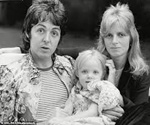
Paul McCartney's daughter Stella McCartney recalled how 'hurt' her late mother was by the bullying she faced from fans.
Linda McCartney was a founding member of her husband's band Wings, which launched in 1971, just a year after he announced he was leaving The Beatles.
McCartney's wife, a photographer by trade, did not always win over critics as she played keyboard and sang harmony in Wings.
In the new documentary Paul McCartney: Man on the Run, her daughter Stella, 54, discussed the impact the criticism had on her mother, who died of cancer in 1998 at age 56.
'She wasn't a cookie-cutter example of someone you put in a band. What they, and she especially, had to go through, like when they isolated her voice and ridiculed her? I mean, it breaks my heart,' the designer said in the documentary.
'I know that there was pain there. I knew she hurt. She wasn't like, cold,' Stella added.
Paul McCartney's, 83, daughter Stella McCartney, 54, recalled how 'hurt' her late mother Linda McCartney was by the bullying she faced from fans and critics; Stella pictured in 2025
Linda, who died of cancer in 1998 at age 56, was a founding member of her husband's band Wings, which launched in 19 details
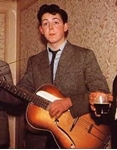
An unassuming Liverpool street went back in time on Monday as director Sam Mendes prepared to shoot scenes for his new anthology of Beatles films outside the childhood home of Sir Paul McCartney.
Mendes is currently working on an ambitious collection of films about the pioneering pop group and their emergence from Liverpool's subterranean Cavern Club to become the biggest and most influential band in the world.
Having already filmed raucous scenes in central London, the director and his team have relocated to Allerton and the modest street outside 20 Forthlin Road, McCartney's home for several years before signing his first record deal with The Beatles in 1962.
Built in 1949, the address was originally bought by McCartney's father Jim in 1955. He would remain their for a decade, until his son – by now a global star – bought him a new house in Heswell, a more prosperous part of the Wirral.
The terraced home, now a National Trust property, was a hive of activity as the street was cut off by traffic cones and diversions were created for oncoming vehicles.
With black tents and vintage cars lining either side of the road, production assistants were seen wheeling period-appropriate details
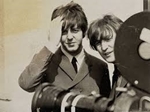
John Lennon delivered some of the most celebrated songs in music history, both during his time with The Beatles and throughout his solo career. Among his most enduring solo works are "Happy Xmas (War Is Over)," "Woman," "Jealous Guy," "(Just Like) Starting Over," "Give Peace a Chance," "Grow Old with Me," "Nobody Told Me," "Watching the Wheels," and arguably his most universally beloved composition, "Imagine." Yet among the many songs Lennon wrote, one held a particularly special place in the heart of Paul McCartney. That song is “Beautiful Boy (Darling Boy),” a deeply personal track from Double Fantasy, his fifth collaborative studio album with Yoko Ono.
John Lennon Wrote "Beautiful Boy (Darling Boy)" as a Tribute to His Son Sean
“I haven’t chosen any Beatles records, but if we had more than eight, I probably would have. I haven’t chosen any of my records so to sum up the whole thing I have chosen one of John Lennon’s from Double Fantasy, which I think is a beautiful song very moving to me. So, I’d like to sum up the whole thing by playing ‘Beautiful Boy.’”
The song reflects Lennon’s desire to protect his child from the world’s uncerta details

The Beatles sang a lot of songs about love and delivered many songs with the word “you” in the title in their early days. But as the 60s progressed, they started to branch out with their lyrics to keep in line with the psychedelic times.
These four songs defy easy description if you just focus on the narrative. But they nonetheless show off the ambition and ingenuity of The Beatles’ songwriters.
“I Am The Walrus”
John Lennon was starting to get fed up with people analyzing his song lyrics looking for deeper meanings between the lines. He decided to purposely send them way off out into the woods with a song that was mostly nonsensical. And yet, what brilliant nonsense “I Am The Walrus” turned out to be. Lennon raised the stakes on Dylanesque stream-of-consciousness writing, adding his love of Lewis Carroll’s wordplay and absurdist humor to a thesaurus-straining choice of words. Throw in a little bit of hippie-ish sentiment: “I am he as you are he as you are me/And we are all together.” Stir it all up and you end up with a surreal masterpiece where the wildness of the music is more than matched by the daring of the words.
“G
details

While Anna Sawai has been busy conquering TV and film, the Emmy-winning “Shōgun” star first got her start in show business as a member of the J-pop band FAKY. Now, Sawai is going back to her musical roots in the role of Yoko Ono in Sam Mendes’ forthcoming “Beatles” biopics.
“It was my dream to tell her story and I didn’t think it would come this quick,” Sawai told Variety at the Los Angeles premiere of Apple TV’s “Monarch: Legacy of Monsters” Season 2 on Thursday night. “There’s a version of her I feel people still don’t understand. And in this film, I think we’re going to be able to tell that side of the story.”
To prepare, Sawai has been busy reading everything she can about the artist and musician. “So much reading, oh my gosh,” she said. “So many books, so many videos, so many articles…She has so much artwork that also shows her personality.”
While on set in London, Sawai teases it’s been fun to hear the cast — Paul Mescal as Paul McCartney, Harris Dickinson as John Lennon, Joseph Quinn as George Harrison and Barry Keoghan as Ringo Starr — play the iconic ba details

It's 1969. The Beatles are trying to record what would become their final albums, and they're at each other's throats. Nothing is working. Then a visitor enters the studio, the keyboard player Billy Preston. On a whim, he sits down to join them for a song, and the mood totally changes.
LENNON: You've given us a lift, Bill. We've been doing this for days.
MARTIN: Did you catch what they said? You're in the group. You've given us a lift. We've been doing this for days. Preston saved those sessions, which is just one reason John Lennon called him the fifth Beatle. But Preston died in 2006. Younger generations barely know who he is. There's a new documentary that hopes to change that. It's called "Billy Preston: That's The Way God Planned It." I spoke with director Paris Barclay.
PARIS BARCLAY: I didn't know about his relationship to Beatles. I didn't know that he played with the Rolling Stones constantly. And as I started to do a little research, I discovered that not only was he a transcendent performer musically, but that his story, including even the tragic things that happened, can be sort of a cautionary tale for how we deal with genius and especially how the Black church deals with people who are diff details
